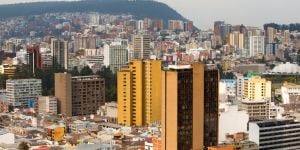IESS (Ecuadorian Social Security) Costs Increasing
Subscribe to the topic
Post new topic
Nards Barley, posted a link to a CuencaHighLife article which stated that IESS (essentially public health insurance) will cost as much of 17.6% of an expat's income.
This is developing news, but it looks like Ecuador for many people will be a lot more expensive.
CuencaHighLife article - Social Security Benefits will cost a lot more
Take a deep breath. And now understand the Rest of the Story...
IESS has ALWAYS cost 17.6% of a persons income. Plus 2.4% each dependent.
So what happened?
Ecuador is shutting a loophole that too many Expats have exploited.
By claiming their income to be the sames as Poverty. About $400, or "the basic Family Food Basket".
So Mr. & Mrs Smith from Anywhere USA has been taking IESS for the same as Juan Carlos Tomala Sanchez the vegetable seller on the corner. Except the Smiths have $1200 in Social Security
Now the Smiths will have to pay $240 a month.
The law has been reinterpreted to Verified Income.
And that is what the Expats in Cuenca learned at the big IESS meeting.
From the article, this looks like a new requirement too -
"Other permanent residents, such as those with investor’s visas, will need to provide proof of monthly income."
So now you need the investment and proof of monthly income? Ouch.
gardener1 wrote:From the article, this looks like a new requirement too -
"Other permanent residents, such as those with investor’s visas, will need to provide proof of monthly income."
So now you need the investment and proof of monthly income? Ouch.
That makes sense because with pensioners they know how much their income is and can determine how much they have to pay. It's not the case for investors, if someone buys a house for example and has the residency, how would they know how much that person has to pay towards IESS?
Yes, you will need to show how you support yourself through work, investment, pension wages, etc.
You would do this for any other form of long term visa. This again, closes a loophole.
Looks to me that Ecuador is more and more less attractive. With the new Immigration law there is additional fees and cost associate with with temporary and permanent visas. Now Ecuadorian Government likes to know your income, so they can tax you and IESS could be just the beginning. When add those numbers, you could have less money in your pocket living in Ecuador than staying in your own home country
I think members here are rational and are able to understand without exaggeration and speculation why IESS payments will increase. I think Susan_in_Ecuador articulated the reason very well.
There was a loophole, and expats were paying the equivalent of an Ecuadorian earning $400 a month. That was a blatant imbalance and the free ride is over. And if one is honest they would acknowledge that this is justified.
So let´s look at this realistically and at face value. We, expats, will have to pay more but no more than any other Ecuadorian. Personally, I prefer to be treated like citizens here, and furthermore I would rather be a member of a health care policy that is sustainable.
Now for whether Ecuador will be more expensive, it´s obvious that it will be, but perhaps for the better because we can feel more confident that IESS will be adequately funded and not exploited.
Based on reports of the new visa-law requirement of health coverage and the IESS increase, I expect that many Expats in Ecuador will drop out of IESS and subscribe to a private health plan.
The private health plan I had (three years ago, before switching to IESS) cost me about $250 a month. For the median Social Security recipient receiving over $1,300 a month that's about what IESS will cost at 17.6 percent of income.
The $83 or so that I paid monthly into IESS this past year was a bargain. But, with the increase: it will not be a relative bargain any more.
If private coverage is available at a similar price, why not switch over to health insurance that gives you more freedom than does IESS to choose your own doctor and hospital, freedom in scheduling appointments, no long wait times (months for IESS) to see some specialists, and more likelihood of obtaining care in English or partially in English....
The $250 I was paying monthly for private coverage was based in part on age and pre-existing condition(s). Many Expats pay much less than that if they're on the sunny side of 50 without pre-existings.
Based on the above, I expect Expats with above-average income will drop IESS and get private coverage .. and yes, Nards, some will choose Colombia over Ecuador -- likely including the editors of International Living.
cccmedia
Sw.
You might get some of those angry "exbrats" swarming the border in direction of the coffee triangle if you were to tell us what the comparable cost of health insurance is in Colombia per month?
P.S. if you believe this question would be better addressed in the "Ask the Expert" thread, I understand.
I didn't get much out of my insider who was in the front row of that IESS presentation.
Here is my question and answer made through text messages.
[5/6, 10:21 AM] : I heard you had front row seats at the recent IESS meeting discussed on Cuencahighlife. What were those folks shouting and did you know them?
[5/6, 10:45 A]: I actually did not know any of the misbehaving gringos! Thank goodness. There were so many, you couldn't understand any of them. Stupid stupid stupid!
It is killing me not to post this comment on the other thread but how can you talk about increasing costs of Ecuadorian healthcare without comparing it to other countries, and in this case Colombia.
I was reading some of the pissing matches over on Gringo Post on this same topic and somebody said paraphrasing, "get the hell out of Ecuador you moocher and go to one of the places" and provided the following link.
https://www.thrillist.com/travel/nation … e-in-world
As you can see Cartagena Colombia was the 2nd beach town listed. The last sentence or so says you can get comprehensive health insurance for $50 a month. We need confirmation on that from the sw., however.
On another forum/blog for expats some have posted their expenses. Cost of medical insurance in Colombia varies but several have posted a cost from 92000 COP to 123000 COP per month which is about $31 USD to $42 USD. It's more for a family. Many expats do not buy insurance but instead pay out of pocket for routine medical care which is quite affordable - I've only had dental procedures done in Colombia and they cost about 1/4 of what they'd cost in the US, but this varies.
Cartagena de Indias is not "dirt cheap" - it's one of the more expensive and touristy places in Colombia. The stated cost on Thrillist of $1200 USD/month would be living at a basic if not bare-bones level IMO.
See here a cost comparison on numbeo.com between Cuenca and Cartagena:
https://www.numbeo.com/cost-of-living/c … =Cartagena
gardener1 wrote:From the article, this looks like a new requirement too -
"Other permanent residents, such as those with investor’s visas, will need to provide proof of monthly income."
So now you need the investment and proof of monthly income? Ouch.
Gardner, congratulations on your decision to retire to Puerto Rico. May the healthcare be first-rate.
Regarding your comment on expats with investor's visas, I read someone on Grinpost wondering the same thing.
Also, I never got a notification of any kind, other than reading about on Facebook, CHL and here. Since I have an investment visa, and zero income (I live off savings), does that mean that 17% of zero is zero? (I doubt it).
Nards Barley wrote:how can you talk about increasing costs of Ecuadorian healthcare without comparing it to other countries, and in this case Colombia.
This week I was reading the same thread that Brother Archer mentioned here .. on the Colombia forum of expat--------.com: $31 to $42 a month for the premium.
Here's what I posted on that thread after seeing those numbers:
"$31 US for medical coverage.
Wow, what a country!"
cccmedia in Medellín, Colombia
The Colombia-system costs vary .. because the health providers in the system are not government owned-and-operated.
Colombia's health coverage offers benefits including lower cost, private care and greater choice.
Ecuador's IESS medical does not charge for co-pays, but the Colombia co-pays I've seen in many Expat reports on the Internet .. are extremely low.
Also, Medellín has more than half a dozen of South America's top 40 clinics and hospitals.
cccmedia in Medellín
cccmedia wrote:Based on reports of the new visa-law requirement of health coverage and the IESS increase, I expect that many Expats in Ecuador will drop out of IESS and subscribe to a private health plan.
The private health plan I had (three years ago, before switching to IESS) cost me about $250 a month. For the median Social Security recipient receiving over $1,300 a month that's about what IESS will cost at 17.6 percent of income.
The $83 or so that I paid monthly into IESS this past year was a bargain. But, with the increase: it will not be a relative bargain any more.
If private coverage is available at a similar price, why not switch over to health insurance that gives you more freedom than does IESS to choose your own doctor and hospital, freedom in scheduling appointments, no long wait times (months for IESS) to see some specialists, and more likelihood of obtaining care in English or partially in English....
The $250 I was paying monthly for private coverage was based in part on age and pre-existing condition(s). Many Expats pay much less than that if they're on the sunny side of 50 without pre-existings.
Based on the above, I expect Expats with above-average income will drop IESS and get private coverage .. and yes, Nards, some will choose Colombia over Ecuador -- likely including the editors of International Living.
cccmedia
Was going to ask what the general cost for private insurance was in Ecuador? Thanks for the breakdown CCC. Would seem unless private coverage spikes up - that it would be the way to go. Assuming the individual is in relatively decent health.
J600rr, yes, but people with spouses/dependents also have to find out the difference in costs between private insurance and IESS because under IESS it was family friendly with minimal increase under the current costs and also minimal increase under the new costs (3.4% increase in addition to the primary applicant’s 17.6%).
vsimple wrote:J600rr, yes, but people with spouses/dependents also have to find out the difference in costs between private insurance and IESS because under IESS it was family friendly with minimal increase under the current costs and also minimal increase under the new costs (3.4% increase in addition to the primary applicant’s 17.6%).
Good point. Because I am a single guy, I tend to make the mistake of always looking at things from that perspective. Yes, a family would be a different situation.
j600rr wrote:Was going to ask what the general cost for private insurance was in Ecuador? Thanks for the breakdown CCC. Would seem unless private coverage spikes up - that it would be the way to go. Assuming the individual is in relatively decent health.
I believe the government has made changes to require private health insurers to provide more comprehensive pre-paid health care packages with coverage for pre-existing conditions and such. The idea being that this would take some of the burden off the IESS. I have noticed ads from seguros.com.ec regarding supplemental private insurance plans for IESS members, which used to have premiums from $36/mo, have recently shot up to $56/mo.
I notice everyone concentrates on the cost of the private insurance. I would like to point out, cheap premium does not cover many things and sometimes is better to have no insurance than pay premium and the premium covers very little and at the end of the day you have to pay for almost everything. As example, the unfortunate Obama care, you could get cheap premium and have insurance, but the copay was $5000 or $6000 copay per year and dental and prescription was not cover you need separate insurance. For many who are in good health and have several doctor visits per year was better not to have insurance, but everyone as you know was forced to have.
Therefore, I would like to see more details of the private insurance the premium and what this low premium will cover, before we could see if the private insurance is good option.
icemeister wrote:I have noticed ads from seguros.com.ec regarding supplemental private insurance plans for IESS members, which used to have premiums from $36/mo, have recently shot up to $56/mo.
I don't recall reading posts about supplementing IESS coverage this way.
Does such a supplement enable the patient/subscriber to avoid long wait times, choose his/her own doctor and care facility .. and-or improve the quality of health care that is available?
cccmedia
No posts, just an email ad I get from the online insurance company I used for my car insurance. Here's the page they link you to in the email: http://seguros.com.ec/publicidad/salud/
pol_can wrote:I would like to see more details of the private insurance the premium and what this low premium will cover, before we could see if the private insurance is good option.
I agree totally with the above point.
Individuals have different ages, health histories, income levels and pre-existing-conditions status. Insurance policies have varying coverage, deductibles and pricing.
For some, IESS coverage remains the optimal choice available.
For others, private coverage will make sense, going forward.
Each Expat will need to make his or her own analysis based on a review of the factors I just listed in order to make a decision that makes sense in any individual case.
cccmedia
Here was an interesting comment today left by somebody on CH
Beth • 5 hours ago
From the ecuaassist website...
"How is the governemnt going to determine if you have health insurance or not?
Having health insurance is a must under the current Ecuadorian immigration
laws, if a person will be applying for a visa transfer, a new cédula
order, when you renew your Certificate of Deposit for your investor
visa, or in customs at the airport, authorities will be allowed by law
to request proof of compliance with the law."
That looks like a health insurance mandate to me for all non citizens including current "permanent residents"
Beth wrote:"How is the governemnt going to determine if you have health insurance or not?
Having health insurance is a must under the current Ecuadorian immigration
laws, if a person will be applying for a visa transfer, a new cédula
order, when you renew your Certificate of Deposit for your investor
visa, or in customs at the airport, authorities will be allowed by law
to request proof of compliance with the law."
That looks like a health insurance mandate to me for all non citizens including current "permanent residents"
Yes, it's a mandate. Get health insurance or risk losing your "permanent" visa rights.
How will they determine if you have health insurance? Beth asked, perhaps rhetorically.
They'll likely require that you show your up-to-date policy and/or provide a copy of same. This could be requested any time you travel out of country at an airport or border crossing. Theoretically, all visa holders could be required to submit a current policy -- either annually or at any interval the government would order .. or under the circumstances described in Beth's citation above.
cccmedia
Until I saw that comment of Beth, I assumed the health insurance requirements did not apply to existing permanent residents, and from what I have read in different comment sections many others did as well.
Assuming that it is true, it is another reason that I am glad to be a citizen.
Firstly, social security is misleading by its name. It is merely an individual's savings account mandated by law. It is not free money but funds paid over many years ,taken from the individuals income. Some call it a pension and that is not correct either. People pay life long for this. It essentially a savings account with the ability to draw a maximum per month. It is essentially net worth limited only by longevity. XPATS with no pension, their choice early on, with millions of dollars available at any time, get healthcare for free. Social Security viewed as income is not exactly what one would view as fair. Lastly, my IESS payment each month was not based on a lie, but the operational procedures of Ecuador. Ecuador for Xpats has been marketed and sold based on those procedures, costs, taxes and etc. What's next?
Dwight Duncan wrote:XPATS with no pension, their choice early on, with millions of dollars available at any time, get healthcare for free.
Expats, "with millions of dollars available at any time, get healthcare for free"...
That doesn't make sense. Would you like to explain?
cccmedia
cccmedia wrote:That doesn't make sense. Would you like to explain?
cccmedia
I spent most of my millions on wine, women and song. The rest of it I just wasted...
Dwight Duncan wrote:Ecuador for Xpats has been marketed and sold based on those procedures, costs, taxes and etc. What's next?
Next is marketing based on the truth. SS income from the USA is annuity income, with up to 85% of it taxable in the USA, and if health insurance rates are based on income, then all USA SS retirement benefits should be included.
Articles to help you in your expat project in Ecuador
 Work in Ecuador
Work in EcuadorEcuador is famous as a retirement haven. But you might not want to wait until retirement age to move there and ...
 Opening a bank account in Ecuador
Opening a bank account in EcuadorA few years back, an expat would just breeze into an Ecuadorian bank, flash their passport and a bank account ...
 Food in Ecuador
Food in EcuadorWhat kind of food will you find in restaurants, cafes, and private homes in Ecuador? Many restaurants in Ecuador ...
 Leisure activities in Ecuador
Leisure activities in EcuadorYou have made it to Ecuador, now what is there to do in your free time? A lifetime in Ecuador isn't enough time to ...
 The Working Holiday Visa for Ecuador
The Working Holiday Visa for EcuadorEcuador is truly a paradise for adventure and nature lovers, and thanks to the Working Holiday Visa program, they ...
 Taxes in Ecuador
Taxes in EcuadorThe Servicio de Rentas Internas or Internal Revenue Service is the authority in charge of taxes in Ecuador. If you ...
 Family and children in Ecuador
Family and children in EcuadorFamily is everything to an Ecuadorian. The extended family unit is the most important aspect of life in Ecuador, ...
 Advice for travelers in Ecuador
Advice for travelers in EcuadorTHE MOST SOUGHT AFTER DOCUMENT IN SOUTH AMERICA
Find more topics on the Ecuador forum



